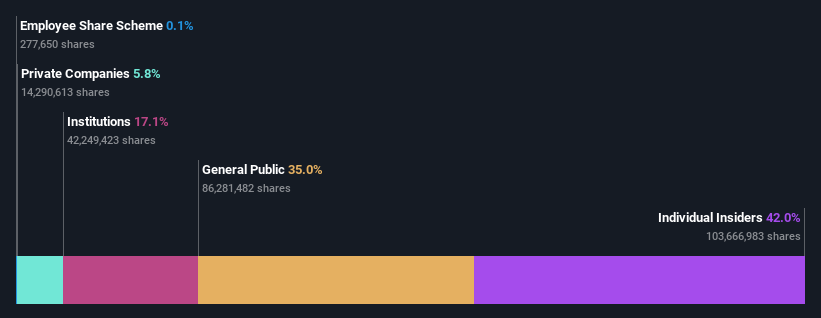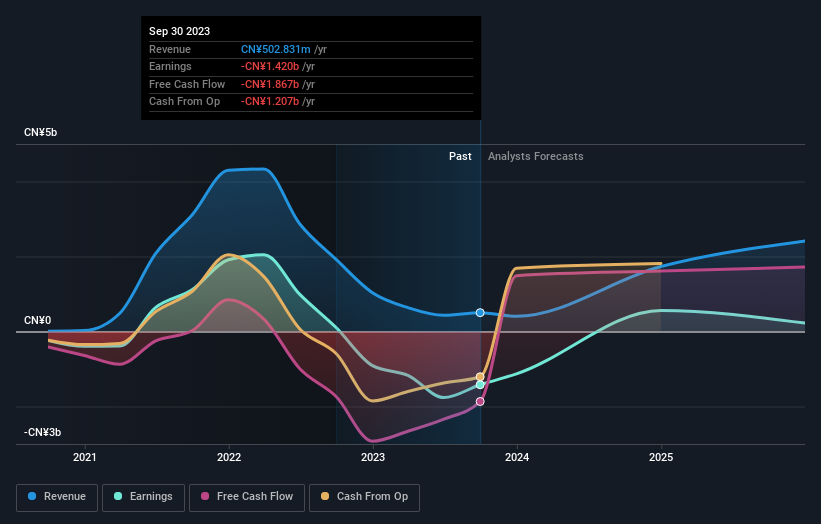Following recent decline, CanSino Biologics Inc.'s (HKG:6185) top shareholder CEO Xuefeng Yu sees holdings value drop by 6.0%

Key Insights
- Significant insider control over CanSino Biologics implies vested interests in company growth
- 51% of the business is held by the top 8 shareholders
- Institutions own 17% of CanSino Biologics
If you want to know who really controls CanSino Biologics Inc. (HKG:6185), then you'll have to look at the makeup of its share registry. With 42% stake, individual insiders possess the maximum shares in the company. Put another way, the group faces the maximum upside potential (or downside risk).
And last week, insiders endured the biggest losses as the stock fell by 6.0%.
Let's delve deeper into each type of owner of CanSino Biologics, beginning with the chart below.
View our latest analysis for CanSino Biologics

What Does The Institutional Ownership Tell Us About CanSino Biologics?
Many institutions measure their performance against an index that approximates the local market. So they usually pay more attention to companies that are included in major indices.
We can see that CanSino Biologics does have institutional investors; and they hold a good portion of the company's stock. This can indicate that the company has a certain degree of credibility in the investment community. However, it is best to be wary of relying on the supposed validation that comes with institutional investors. They too, get it wrong sometimes. When multiple institutions own a stock, there's always a risk that they are in a 'crowded trade'. When such a trade goes wrong, multiple parties may compete to sell stock fast. This risk is higher in a company without a history of growth. You can see CanSino Biologics' historic earnings and revenue below, but keep in mind there's always more to the story.

We note that hedge funds don't have a meaningful investment in CanSino Biologics. The company's CEO Xuefeng Yu is the largest shareholder with 12% of shares outstanding. Dongxu Qiu is the second largest shareholder owning 11% of common stock, and Huihua Mao holds about 11% of the company stock. Interestingly, the second-largest shareholder, Dongxu Qiu is also Top Key Executive, again, pointing towards strong insider ownership amongst the company's top shareholders.
We did some more digging and found that 8 of the top shareholders account for roughly 51% of the register, implying that along with larger shareholders, there are a few smaller shareholders, thereby balancing out each others interests somewhat.
While it makes sense to study institutional ownership data for a company, it also makes sense to study analyst sentiments to know which way the wind is blowing. There are a reasonable number of analysts covering the stock, so it might be useful to find out their aggregate view on the future.
Insider Ownership Of CanSino Biologics
The definition of company insiders can be subjective and does vary between jurisdictions. Our data reflects individual insiders, capturing board members at the very least. The company management answer to the board and the latter should represent the interests of shareholders. Notably, sometimes top-level managers are on the board themselves.
Most consider insider ownership a positive because it can indicate the board is well aligned with other shareholders. However, on some occasions too much power is concentrated within this group.
Our most recent data indicates that insiders own a reasonable proportion of CanSino Biologics Inc.. It has a market capitalization of just HK$14b, and insiders have HK$5.7b worth of shares in their own names. That's quite significant. Most would say this shows a good degree of alignment with shareholders, especially in a company of this size. You can click here to see if those insiders have been buying or selling.
General Public Ownership
The general public-- including retail investors -- own 35% stake in the company, and hence can't easily be ignored. This size of ownership, while considerable, may not be enough to change company policy if the decision is not in sync with other large shareholders.
Private Company Ownership
It seems that Private Companies own 5.8%, of the CanSino Biologics stock. It's hard to draw any conclusions from this fact alone, so its worth looking into who owns those private companies. Sometimes insiders or other related parties have an interest in shares in a public company through a separate private company.
Next Steps:
It's always worth thinking about the different groups who own shares in a company. But to understand CanSino Biologics better, we need to consider many other factors. For example, we've discovered 1 warning sign for CanSino Biologics that you should be aware of before investing here.
But ultimately it is the future, not the past, that will determine how well the owners of this business will do. Therefore we think it advisable to take a look at this free report showing whether analysts are predicting a brighter future.
NB: Figures in this article are calculated using data from the last twelve months, which refer to the 12-month period ending on the last date of the month the financial statement is dated. This may not be consistent with full year annual report figures.
New: AI Stock Screener & Alerts
Our new AI Stock Screener scans the market every day to uncover opportunities.
• Dividend Powerhouses (3%+ Yield)
• Undervalued Small Caps with Insider Buying
• High growth Tech and AI Companies
Or build your own from over 50 metrics.
Have feedback on this article? Concerned about the content? Get in touch with us directly. Alternatively, email editorial-team (at) simplywallst.com.
This article by Simply Wall St is general in nature. We provide commentary based on historical data and analyst forecasts only using an unbiased methodology and our articles are not intended to be financial advice. It does not constitute a recommendation to buy or sell any stock, and does not take account of your objectives, or your financial situation. We aim to bring you long-term focused analysis driven by fundamental data. Note that our analysis may not factor in the latest price-sensitive company announcements or qualitative material. Simply Wall St has no position in any stocks mentioned.
About SEHK:6185
CanSino Biologics
Develops, manufactures, and commercializes vaccines in the People’s Republic of China.
High growth potential with adequate balance sheet.

